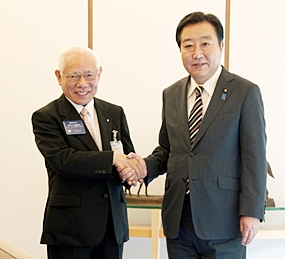Rotary International President-elect Sakuji Tanaka heard reassuring words from Prime Minister Yoshido Noda regarding Japan’s continued support of polio eradication, the humanitarian organization’s top philanthropic goal, during a face-to-face meeting between the two leaders on May 30.
“Needless to say, we should (continue to) help with the issue of polio eradication,” Noda told Tanaka, a retired business executive from Saitama. The prime minister added that Japan’s history of supporting global humanitarian efforts, including polio eradication, was no doubt a factor in the massive outpouring of aid and support from the international community in the wake of the devastating earthquake and tsunami that struck eastern Japan in March 2011.
 R.I. President Elect Sakuji Tanaka (left) meets with Prime Minister Yoshido Noda of Japan.
R.I. President Elect Sakuji Tanaka (left) meets with Prime Minister Yoshido Noda of Japan.
To date, Japan has invested US$445.1 million (about 13.353 billion baht) in global polio eradication, making it the third largest public sector donor to the Global Polio Eradication Initiative (GPEI). Rotary clubs worldwide have contributed more than $1.2 billion toward ending polio, with Rotary clubs in Japan accounting for more than $64 million.
Tanaka commended Japan for its longstanding leadership in the fight against this crippling disease, noting that it is particularly important now, following the World Health Assembly’s recent declaration that “the completion of polio eradication is a programmatic emergency for global public health.”
“Polio eradication efforts would not be possible without the support from Japan,” Tanaka told the prime minister. “I am certain that polio cases will continue to decrease, and that the support from Japan will play an essential role.”
Since Rotary began its polio eradication efforts in 1985 and co-launched the GPEI in 1988, polio cases have plunged 99 percent worldwide, from 350,000 cases a year to fewer than 700 in 2011. In February 2012, India, once the world’s largest global exporter of polio cases, became the last country in Southeast Asia (as defined by the World Health Organization) to be removed from the polio-endemic list.
Only three countries remain polio-endemic: Afghanistan, Nigeria, and Pakistan. However, other nations remain at risk for infections “imported” from the endemic countries. Continued funding from the government of Japan will be essential for the successful completion of this historic initiative, particularly in the outbreak affected countries in west, central and the Horn of Africa.
Rotary members travel at their own expense to join fellow members in polio-affected countries to immunize children against polio during national campaigns. A team of volunteers from Rotary clubs in Japan’s Aichi Prefecture went to India in April to help immunize children under the age of five. In 2010, more than 20 Japanese Rotary members went to India to participate in immunization activities. Tanaka emphasized, “Now is the first time in 25 years that we are within reach of the finish line of global polio eradication. We are especially proud that India has been removed from the World Health Organization’s list of polio-endemic countries.”
During his one-year term as president, which begins 1 July, Tanaka will lead a global network of 1.2 million business and professional leaders from more than 200 countries and geographical regions who, through volunteer service, help meet the needs of communities worldwide.
Tanaka, a member of Rotary since 1975, and the international organization’s third president from Japan, said he would like to see Rotary “continue its vital work as the force to improve communities around world.”
Rotary clubs have long embraced the call for peace at the grass-roots level by addressing the underlying causes of conflict and violence through thousands of community-based service projects around the world. Since 2002, Rotary has taken a more direct approach to world understanding. Rotary’s Peace Centers program offers graduate degrees in peace and conflict resolution at campus-based centers worldwide, including the International Christian University in Tokyo. A professional development certificate is offered at Rotary’s Peace Center in Bangkok.
As president, Tanaka will hold peace forums in Berlin (30 Nov. – 2 Dec. 2012), Honolulu (25-27 Jan. 2013) and Hiroshima (17-18 May 2013). “While these events will take place at historic sites, the main emphasis will be on the future and youth,” said Tanaka.
Rotary members often are both first responders and re-builders when major disasters strike because Rotary clubs are present in every corner of the world. In response to the massive earthquake off of the coast of Japan and the resulting tsunami on in March 2011, Rotary raised more than $7.8 million to support of longer-term disaster recovery efforts in Japan and the Pacific island nations.
Under its new Future Vision plan, Rotary seeks to forge strategic partnerships with established organizations with expertise in any of Rotary’s six areas of focus: peace and conflict prevention/resolution; disease prevention and treatment; water and sanitation; maternal and child health; basic education and literacy; and economic and community development.




